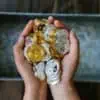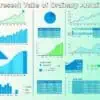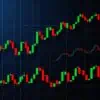The futures market is important to the global financial system. It lets buyers and sellers agree on future prices. This market helps manage risk and find prices for different assets. If you’re interested in this topic more, you should keep reading!

What’s a Futures Market?
A future market is where you can trade contracts for future goods. These contracts say how much and what quality the goods will be. This helps find prices and manage risks.
Definition and Key Characteristics
Futures markets are known for their standardized contracts. These are different from custom-made forward contracts. The standardization makes the market liquid and clear, making it easy to join or leave trades.
Clearinghouses are also key in futures markets. They act as the middleman in trades, reducing the risk of one side not paying. They also help settle trades and manage money between traders.

How Futures Contracts Work?
They are deals to buy or sell something. But at a set price and time later. Most are settled in cash, not by actually delivering the goods.
Let’s use corn as an example. When the price of corn changes, the contract’s value changes too. If corn prices go up, the buyer gets the corn for less money. If corn prices go down, the seller sold it for more than it’s now worth.
The Basics of a Futures Market
Here are the market’s basics, like who’s involved, the contracts they trade, and margin and leverage.
Associates in the Futures Market
There are two types of traders:
- hedgers
- speculators
Hedgers use futures to manage risks from price changes. They lock in prices to protect against losses.
Speculators aim to make money from price changes. They buy and sell futures based on their price guesses. They help the market by making it easier for hedgers to find trades.
Types of Futures Contracts
These are commodity and financial futures. Commodity futures deal with physical goods like food and metals. They involve things like currencies and stock prices.
- Corn futures
- Crude oil futures
- Gold futures
- Livestock futures

Financial futures are about financial items. They let investors bet on or protect against changes in these items.
- S&P 500
- U.S. Treasury bond
- Euro FX
- NASDAQ 100
Margin Requirements and Leverage
Initial margin is for opening a trade. Maintenance is for keeping it open.
Leverage is a big part of futures trading. It lets you control big positions with small amounts of money. But, it also means big risks.
Leverage can raise profits, but it can also lead to losses.
| Margin Type | Description |
|---|---|
| Initial Margin | The amount required to open a futures position |
| Maintenance Margin | The minimum balance that must be maintained to keep the position open |
Knowing the futures market basics is key for anyone thinking about joining. It’s about understanding hedgers, speculators, contracts, and margin and leverage.
Major Futures Markets
The futures market is a place where you trade items. There are a few big exchanges. These places help people manage risk, find prices, and guess the future value of things.
Commodities Futures Markets
Commodities futures markets are places where people trade contracts. These markets help people deal with changes in prices.
Financial Futures Markets
These trade contracts for stocks, bonds, and money. The CME is the largest market for these contracts.
Equity index futures, let people track the stock market without owning stocks. Currency futures protect against changes in foreign money. They can profit from currency shifts.
The financial futures markets are key in the global economy. They help with risk management, price discovery, and capital allocation.
The table below shows the main features of the major futures markets:
| Futures Market | Exchange | Products |
|---|---|---|
| Commodities | CBOT | Agricultural products, metals |
| Commodities | NYMEX | Energy, metals |
| Financial | CME | Equity index futures, interest rate futures, currency futures |
The futures markets have grown. They have new electronic trading, and more products. They are crucial in the global financial system. They help people manage risk and find prices in a fair and clear way.
Futures Market Example
Let’s take crude oil as an example.. An oil producer wants to set a selling price for their oil. An airline wants to buy jet fuel at a fixed price to control costs. They both use the futures market to meet their needs.
The oil producer and the airline make a futures contract through the New York Mercantile Exchange. The contract has key details:
- WTI crude oil
- Amount: 1,000 barrels
- Delivery month: December
- Price: $60 for each barrel
Both must post a margin with the exchange’s clearinghouse to ensure they’ll meet their obligations.
As December gets closer, the oil price might change due to market factors. Let’s look at two possible scenarios:
| Scenario | Spot Price at Expiration | Outcome for Oil Producer (Seller) | Outcome for Airline (Buyer) |
|---|---|---|---|
| 1 | $55 per barrel | Gains $5 per barrel | Loses $5 per barrel |
| 2 | $65 per barrel | Loses $5 per barrel | Gains $5 per barrel |
The first example shows that the oil producer wins. The reason is because they sold oil for $60 per barrel. Even though the market price went down to $55. The airline lost because they had to pay $60.
The second example, the airline wins. It’s because they got the oil for $60 per barrel, and the market price went up to $65. The oil producer lost because they had to sell it for $60.
This shows how future contracts work to manage risk. By setting prices ahead of time, both sides can plan and worry less about price changes.
Most of the contracts are set with cash. The difference between the agreed price and the market price is paid, which leads to a profit or loss.
Conclusion
The futures market makes market efficiency better. It offers clear prices and helps information flow smoothly. It attracts many types of traders, from those who want to reduce risk to those who seek profit.
There are many futures contracts available. They cover everything from commodities to financial products. This meets the needs of all market participants. Before you start with futures trading, you should be well informed about everything. Learn about the market and create plans.
FAQ
It’s a place where people trade contracts.
The contracts are standard, and they’re easy. Buyers must buy, and the sellers must sell.
Hedgers, and Speculators.
Commodities, and financial futures.
There’s initial margin to start, and maintenance margin to keep.
You buy more with less money. Traders must use leverage wisely and manage risks well.











